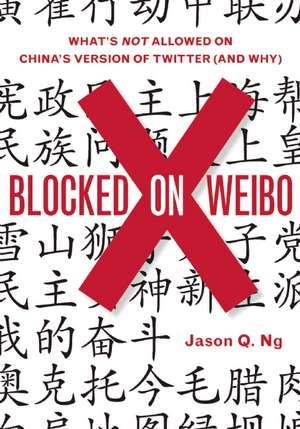Blocked on Weibo: What Gets Suppressed on China's Version of Twitter (and Why)
Autor Jason Q. Ngen Limba Engleză Paperback – 26 aug 2013
Though often described with foreboding buzzwords such as "The Great Firewall" and the "censorship regime," Internet regulation in China is rarely either obvious or straightforward. This was the inspiration for China specialist Jason Q. Ng to write an innovative computer script that would make it possible to deduce just which terms are suppressed on China’s most important social media site, Sina Weibo. The remarkable and groundbreaking result is Blocked on Weibo, which began as a highly praised blog and has been expanded here to list over 150 forbidden keywords, as well as offer possible explanations why the Chinese government would find these terms sensitive.
As Ng explains, Weibo (roughly the equivalent of Twitter), with over 500 million registered accounts, censors hundreds of words and phrases, ranging from fairly obvious terms, including "tank" (a reference to the "Tank Man" who stared down the Chinese army in Tiananmen Square) and the names of top government officials (if they can’t be found online, they can't be criticized), to deeply obscure references, including "hairy bacon" (a coded insult referring to Mao’s embalmed body).
With dozens of phrases that could get a Chinese Internet user invited to the local police station "for a cup of tea" (a euphemism for being detained by the authorities), Blocked on Weibo offers an invaluable guide to sensitive topics in modern-day China as well as a fascinating tour of recent Chinese history.
As Ng explains, Weibo (roughly the equivalent of Twitter), with over 500 million registered accounts, censors hundreds of words and phrases, ranging from fairly obvious terms, including "tank" (a reference to the "Tank Man" who stared down the Chinese army in Tiananmen Square) and the names of top government officials (if they can’t be found online, they can't be criticized), to deeply obscure references, including "hairy bacon" (a coded insult referring to Mao’s embalmed body).
With dozens of phrases that could get a Chinese Internet user invited to the local police station "for a cup of tea" (a euphemism for being detained by the authorities), Blocked on Weibo offers an invaluable guide to sensitive topics in modern-day China as well as a fascinating tour of recent Chinese history.
Preț: 64.55 lei
Preț vechi: 82.02 lei
-21% Nou
Puncte Express: 97
Preț estimativ în valută:
12.35€ • 12.85$ • 10.34£
12.35€ • 12.85$ • 10.34£
Carte indisponibilă temporar
Doresc să fiu notificat când acest titlu va fi disponibil:
Se trimite...
Preluare comenzi: 021 569.72.76
Specificații
ISBN-13: 9781595588715
ISBN-10: 159558871X
Pagini: 224
Dimensiuni: 137 x 208 x 20 mm
Greutate: 0.3 kg
Editura: New Press
ISBN-10: 159558871X
Pagini: 224
Dimensiuni: 137 x 208 x 20 mm
Greutate: 0.3 kg
Editura: New Press
Recenzii
Praise for Blocked on Weibo:
"It's an engaging new volume chock full of illuminating, sometimes amusing entries on temporarily or permanently banned terms."
—Jeffrey Wasserstrom, Chancellor's Professor of History, University of California, Irvine
"This is a fascinating study with important implications for anyone who is interested in the intellectual and political climate of contemporary China. Highly recommended."
—Victor H. Mair, Professor of Chinese Language and Literature, University of Pennsylvania
"What makes his blog—and the book it has now spawned—so attractive is Ng's wit and erudition. Some entries in this Devil's Dictionary for digital times are simply descriptive, but many open surprising windows onto the wonderfully creative strategies Chinese internet users employ to circumvent blocks."
—Times Literary Supplement
Praise for the Blocked on Weibo blog that inspired the book:
"Blocked on Weibo is interesting for those with any knowledge of China and its Internet space, right from beginners to old hands."
—Jon Russell, The Next Web
"Censorship nerds: check out Blocked on Weibo, an amazingly useful blog on what’s blocked in China and why."
—Andrew McLaughlin, VP of Tumblr, and former White House deputy chief technology officer
"A treasure."
—Thomson Reuters
"It's an engaging new volume chock full of illuminating, sometimes amusing entries on temporarily or permanently banned terms."
—Jeffrey Wasserstrom, Chancellor's Professor of History, University of California, Irvine
"This is a fascinating study with important implications for anyone who is interested in the intellectual and political climate of contemporary China. Highly recommended."
—Victor H. Mair, Professor of Chinese Language and Literature, University of Pennsylvania
"What makes his blog—and the book it has now spawned—so attractive is Ng's wit and erudition. Some entries in this Devil's Dictionary for digital times are simply descriptive, but many open surprising windows onto the wonderfully creative strategies Chinese internet users employ to circumvent blocks."
—Times Literary Supplement
Praise for the Blocked on Weibo blog that inspired the book:
"Blocked on Weibo is interesting for those with any knowledge of China and its Internet space, right from beginners to old hands."
—Jon Russell, The Next Web
"Censorship nerds: check out Blocked on Weibo, an amazingly useful blog on what’s blocked in China and why."
—Andrew McLaughlin, VP of Tumblr, and former White House deputy chief technology officer
"A treasure."
—Thomson Reuters
Notă biografică
Jason Q. Ng is a research consultant for China Digital Times and a 2013 Google Policy Fellow at the Citizen Lab. His work has been featured in Le Monde, the Huffington Post, the Next Web, Asia Pacific Forum, and Shanghaiist. He writes regularly on China for Waging Nonviolence. He lives in New Jersey.
